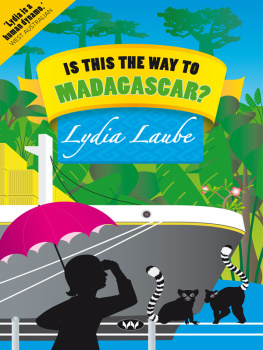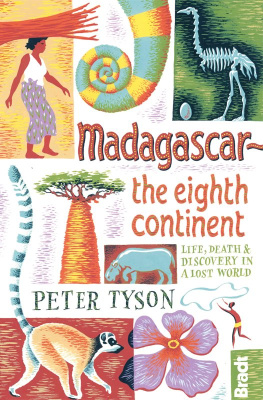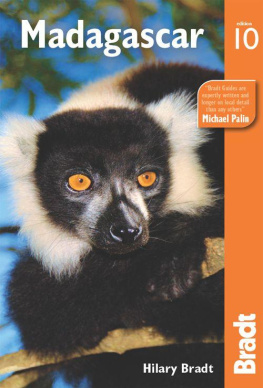Steven M. Goodman - Windows into the Extraordinary: Madagascar Land Mammals and Their Ecosystems
Here you can read online Steven M. Goodman - Windows into the Extraordinary: Madagascar Land Mammals and Their Ecosystems full text of the book (entire story) in english for free. Download pdf and epub, get meaning, cover and reviews about this ebook. year: 2014, publisher: University Of Chicago Press, genre: Home and family. Description of the work, (preface) as well as reviews are available. Best literature library LitArk.com created for fans of good reading and offers a wide selection of genres:
Romance novel
Science fiction
Adventure
Detective
Science
History
Home and family
Prose
Art
Politics
Computer
Non-fiction
Religion
Business
Children
Humor
Choose a favorite category and find really read worthwhile books. Enjoy immersion in the world of imagination, feel the emotions of the characters or learn something new for yourself, make an fascinating discovery.

- Book:Windows into the Extraordinary: Madagascar Land Mammals and Their Ecosystems
- Author:
- Publisher:University Of Chicago Press
- Genre:
- Year:2014
- Rating:4 / 5
- Favourites:Add to favourites
- Your mark:
- 80
- 1
- 2
- 3
- 4
- 5
Windows into the Extraordinary: Madagascar Land Mammals and Their Ecosystems: summary, description and annotation
We offer to read an annotation, description, summary or preface (depends on what the author of the book "Windows into the Extraordinary: Madagascar Land Mammals and Their Ecosystems" wrote himself). If you haven't found the necessary information about the book — write in the comments, we will try to find it.
Steven M. Goodman: author's other books
Who wrote Windows into the Extraordinary: Madagascar Land Mammals and Their Ecosystems? Find out the surname, the name of the author of the book and a list of all author's works by series.
Windows into the Extraordinary: Madagascar Land Mammals and Their Ecosystems — read online for free the complete book (whole text) full work
Below is the text of the book, divided by pages. System saving the place of the last page read, allows you to conveniently read the book "Windows into the Extraordinary: Madagascar Land Mammals and Their Ecosystems" online for free, without having to search again every time where you left off. Put a bookmark, and you can go to the page where you finished reading at any time.
Font size:
Interval:
Bookmark:
Steven M. Goodman is the MacArthur Field Biologist at the Field Museum, Chicago, and based in Antananarivo, Madagascar. William L. Jungers is distinguished teaching professor and chair of anatomical sciences at Stony Brook University School of Medicine. Velizar Simeonovski is an artist based in Chicago who specializes in reconstructions of extinct species and prehistoric landscapes.
The University of Chicago Press, Chicago 60637
The University of Chicago Press, Ltd., London
2014 by The University of Chicago
Plates 2014 by Velizar Simeonovski
All rights reserved. Published 2014.
Printed in the United States of America
23 22 21 20 19 18 17 16 15 14 1 2 3 4 5
The University of Chicago Press wishes to acknowledge gratefully the Critical Ecosystem Partnership Fund, the Ellis Goodman Family Foundation, the Field Museum of Natural History, and Association Vahatra for their generous contributions toward the publication of Extinct Madagascar: Picturing the Islands Past.
ISBN-13: 978-0-226-14397-2 (cloth)
ISBN-13: 978-0-226-15694-1 (e-book)
DOI: 10.7208/chicago/9780226156941.001.0001
Library of Congress Cataloging-in-Publication Data
Goodman, Steven M., author.
Extinct Madagascar: picturing the islands past / Steven M. Goodman and William L. Jungers; plates by Velizar Simeonovski.
pages cm
Includes bibliographical references and index.
ISBN 978-0-226-14397-2 (cloth) ISBN 978-0-226-15694-1 (e-book) 1. FossilsMadagascar. 2. AnimalsMadagascar. 3. GeologyMadagascar. 4. PlantsMadagascar. 5. Natural historyMadagascar. I. Jungers, William L., 1948 author. II. Title.
QE757.M28G664 2014
560.691dc23 | 2014016894 |
 This paper meets the requirements of ANSI/NISO Z39.48-1992 (Permanence of Paper).
This paper meets the requirements of ANSI/NISO Z39.48-1992 (Permanence of Paper).
Extinct Madagascar:
Picturing the Islands Past
Steven M. Goodman and
William L. Jungers
Plates by Velizar Simeonovski
The University of Chicago Press
Chicago and London
To our families (Asmina, Hesham, Vavizara, Mboty, Mahery, Mandresy, Matthew, and Jocelyn)
and
In memory of Madame Berthe Rakotosamimanana and Robert Dewar
Contents
Madagascar, like Africa, is not a place for the faint-hearted. If you are prone to complain a lot, you will find lots to complain about in this challenging land, with its climate extremes, bad roads, complex bureaucracy, and, for a foreigner, just plain strangeness. It is thus no surprise that, again like Africa, the kind of vazaha (foreigners) who take to Madagascar tend to be extraordinary people. Steve Goodman and Bill Jungers are two of the first examples to come to mind, and their remarkable resolve, thoroughness, and persistence is in evidence on every page of this book. These are not timid people, and I have never had a boring moment with either of them.
Steve was somebody whom I did not actually run into in Madagascar until well into my many years there. I was down in one of the most arid parts of southwest Madagascar, by that remarkable hypersaline playa lake with the unpronounceable name: Tsimanampetsotsa (for understandable reasons, it often turns up in the literature with alternate spellings).
I admit to having been a little skeptical at first. Here was this scrawny, hirsute white guy, like myself, but who also had, like me, plenty of training for Madagascar in Africa. He was traveling alone, checking out sites for what would eventually be a uniquely stellar career on this island nation. Steve was a neophyte on the island and lacked the reflex that comes through experience, but he had a certain somethinga determination and quickness of witthat is essential for success en brousse in a place like Madagascar. I came away from our first encounter, after hearing about his optimistic agenda, thinking: This guy will go far in Madagascaror die trying.
Now, a quarter century later, Steve Goodman is the name on the lips of more Malagasy people out in every remote place in Madagascar than any othervazaha who has anything to do with nature. In this juncture, I remember visiting one particularly remote cave in Madagascar. At the nearest village, while doing my visite de courtoisieshowing my papers, finding out what sort of stuff to watch out for around there, and hiring local camp help and guidesI asked the chief if any other vazaha had come out to see his cave in recent years. His answer was similar to one I have heard in other remote villages: Yes, there was one a few years agohe looked like Jesus. Well, it would not be much hyperbole to say that if nature in Madagascar has a savior, Steve is probably it.
But I have never really worked much with Steve, except on a few papers about interesting fossils I have found that he took an interest in, and contributions to a couple of his excellent edited volumes. By the time he was hitting full stride there, I was looking at places with interesting similarities and differences elsewhere around the world. I sincerely wish we could have worked together more, and, in fact, we are making plans for an upcoming project in one of the most remote places in western Madagascar, where I really look forward to getting to know this unforgettable character better.
My recollections of early Steve Goodman are scant and perhaps tattered by too many hard decades in remote places and confused by too many other stories not yet written down. Bill Jungers, on the other hand, I know a lot better; I count him among my best friends, and on reflection he has probably saved my life indirectly at least once or twice, simply by being there with his always casual and friendly demeanorand his imposing size. Tall and stocky, Billi-be, as Malagasy often call him (Big Bill), is a true giant of a man in every way. Like Steve, he has a CV full of enviable accomplishments that just go on and on, decade after decade. He is also truly full of what we out here in Hawaii call Aloha, a kind of radiant positive attitude that overpowers the negative forces so often arrayed on all sides in our kind of complicated endeavors. He is at once both a dead-serious academic administrator and a top-notch scientist in his several chosen fields. At the same time, he is more fun to be around than anybody of his academic stature whom I have ever shared an expedition with, and we have had plenty of adventures in essentially every quarter of Madagascar, for a very long time. I got my start with Madagascar research in the early 80s, and he had been around the island for several years by then, so I learned a lot from him. Along with Elwyn Simons, he was one of the few Americans one had any chance of running into in the wilds of Madagascar in those years. Back then, if I encountered a Caucasian in Madagascar, I was just as likely to have to resort to my pitiful recollection of Russian as English or French.
Bill and I had many rewarding and enjoyable seasons in many of the wonderful but challenging places discussed in this book: Anjohibe, Andrahomana, Ampasambazimba, Antsirabe, Belo sur Mer, and many others. We found a lot of stuff you will read about in this excellent compendium, but we also befriended many truly memorable Malagasy characters and, more cheerfully than you might imagine, shared car breakdowns, close encounters with crooks, bureaucratic obstacles, rivers with no bridge, and bad weather. One night in particular I will never forget, when an unannounced windstorm of cyclone force struck our camp near Andrahomana, and our entire crew piled into Bills tentthe only one left standingthen spent an arduous night hugging the ground as the tent collapsed on top of us, the wind howled, a lot of rain fell, and the lightning played above the aluminum framework of his big new tent that was ruined on its first outing. You need somebody like Bill around to be able to laugh it off the next morning.
Next pageFont size:
Interval:
Bookmark:
Similar books «Windows into the Extraordinary: Madagascar Land Mammals and Their Ecosystems»
Look at similar books to Windows into the Extraordinary: Madagascar Land Mammals and Their Ecosystems. We have selected literature similar in name and meaning in the hope of providing readers with more options to find new, interesting, not yet read works.
Discussion, reviews of the book Windows into the Extraordinary: Madagascar Land Mammals and Their Ecosystems and just readers' own opinions. Leave your comments, write what you think about the work, its meaning or the main characters. Specify what exactly you liked and what you didn't like, and why you think so.







